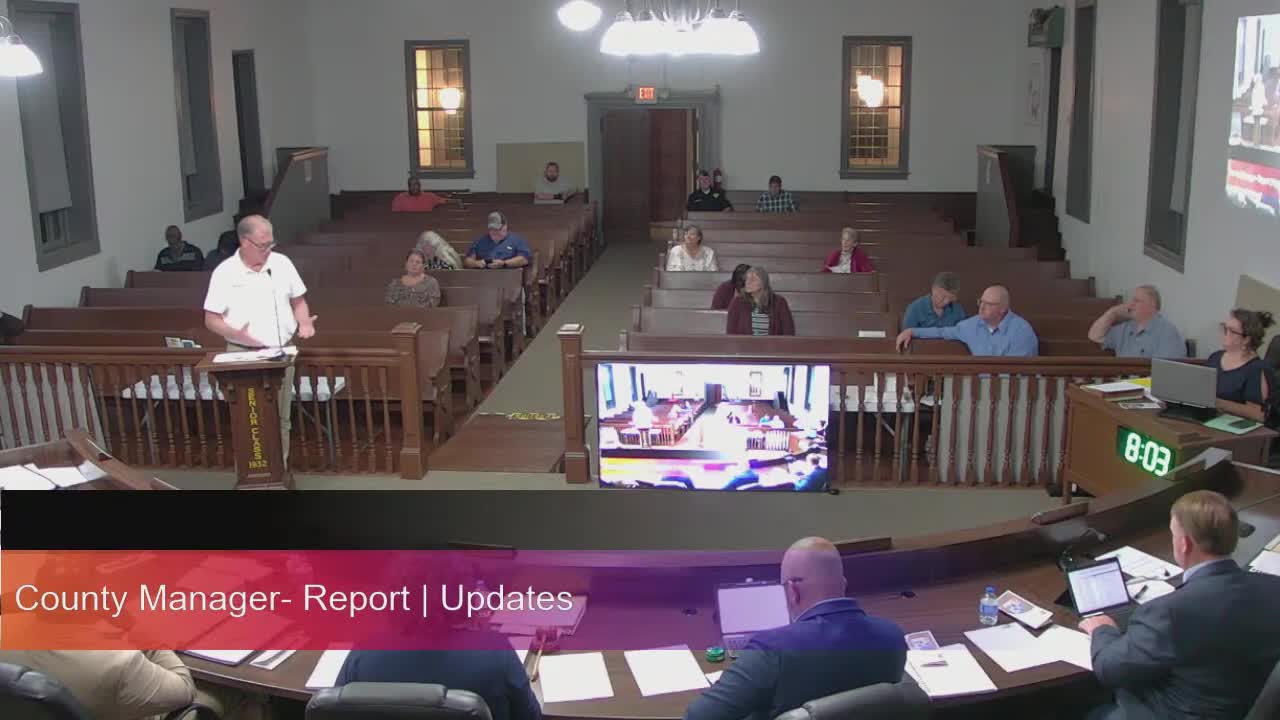County gets multi-project water and wastewater update; pilot tests planned for fluoride treatment
Get AI-powered insights, summaries, and transcripts
Subscribe
Summary
Green Engineering and county staff outlined a portfolio of SRF-funded water and wastewater projects, timelines and anticipated debt-service impacts; the county will pilot three fluoride-treatment options — reverse osmosis, bone-char carbon and anion exchange — with proposals due and testing planned no later than January.
County engineers and staff gave the Gates County Board of Commissioners a consolidated update on multiple water and wastewater projects, funding sources and a planned treatment pilot to address naturally occurring fluoride in the county’s public water supply.
The briefing covered U.S. state revolving fund (SRF) projects, transmission and distribution improvements, a proposed 300,000‑gallon elevated water tank and separate steps required for school-related wastewater projects. County and consultant staff described the permitting path, Local Government Commission (LGC) review for SRF loans and the anticipated construction schedule.
Key projects and schedule - Honeypot Road land-application site (SRF): plans and specifications submitted; consultant said the Division of Water Infrastructure review and plan/spec approval letter are prerequisites to advertising for bids. - Water-system improvements: four bundled waterline work packages (Bennetts Creek crossing, Carter’s Road reconnection, a transmission main and Highway 158 line extension) have been submitted to permitting and are under state review. - School wastewater projects (Buckland and T.S. Cooper): plans were near completion; one large project includes principal forgiveness and a loan component. - 300,000‑gallon elevated storage tank: geotechnical work scheduled; consultant expects subsurface exploration in November followed by design and permitting.
Funding and debt Consultants presented a summary of expected SRF funding for the portfolio. One consolidated estimate showed combined annual debt service of about $130,000 if projects were completed at once; principal forgiveness will reduce the net loan amounts. County staff indicated the plan was to use capital-reserve funds (article-designated sales-tax proceeds) to smooth near-term debt service rather than assigning costs directly to the small number of current utility customers.
Fluoride-treatment pilot County staff and consultants outlined a pilot plan that will test three treatment approaches for fluoride removal at a demonstration scale: (1) reverse osmosis (RO), (2) bone-char carbon media, and (3) anion-exchange systems. The board was told proposals for pilot testing were being obtained and the county expects testing to begin no later than January; staff said they will present the pilot scope and ask the board to review before work begins.
Why it matters: The projects together represent multi-million-dollar infrastructure investments intended to expand service areas, replace aging assets and address water-quality issues. The fluoride pilot will determine a technical and cost-effective remedy before the county selects a full-scale treatment approach.
Quotes and technical notes Leo Green, an engineer with Green Engineering, told the board that portions of the asset-assessment and mapping work were complete: "Those portions are 100% complete," he said when describing the water and sewer inventory and GIS deliverables, and he said the firm was addressing state reviewer comments.
Next steps Consultants expect to return with procurement-ready packages, after which the board will see requests for resolutions and authority-to-award documents required by SRF and LGC rules. Staff said they will schedule a board presentation after the state completes its review and before major procurement actions. The board asked staff to provide the pilot scope for review prior to authorizing the pilot test.
Ending: County staff told commissioners they expect several projects to be under contract by mid‑next year if state reviews proceed on the current timetable. Board members asked for continued briefings as pilot proposals and bid packages clear final review.
